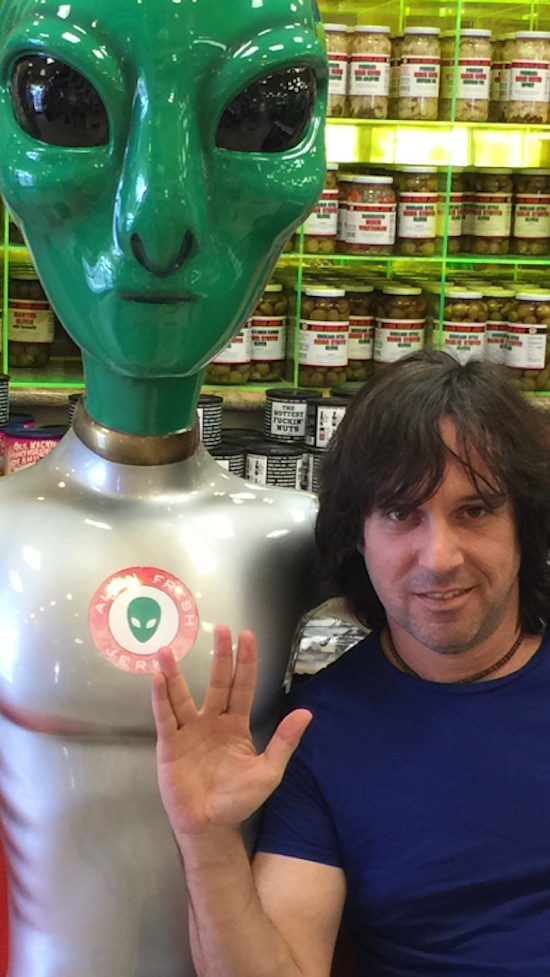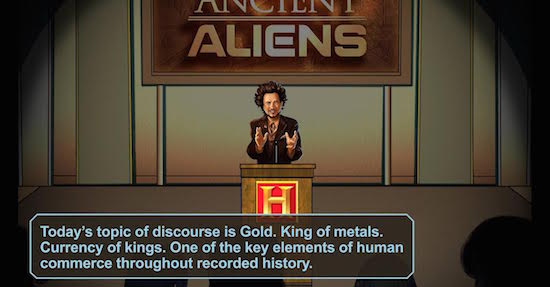
Creative Commons Interview: Cory Doctorow — Walkaway1
Posted In Activism,Art,Blog,Books,DIY,Entertainment,Favorites,Fiction,Gaming,Geek,Internuts,Interviews,Politics,Science
The action in Cory Doctorow’s new novel, Walkaway, takes place in — and outside of — a dystopian society where the resistance, instead of fighting to change it, have decided to walk away from it. Plagued by inequality gone wild and the ravages of climate change, the “default” society is divided into the elite “zotta” have-everything class and the proletariat for whom — in an extreme gig economy — even an honest day’s work is a luxury.
With no hope of even getting on the first rung of success’s ladder, leaving default to occupy abandoned spaces outside of the fortified cities and create a new society based on community-forward ideals is not only the ultimate act of defiance for the disaffected, it just makes plain sense for those who see through the shared fiction that currency is the preeminent measure of value. Thus the ever-morphing domain of the walkaways attracts some of the brightest young minds who, in a post-scarcity world, can 3D print almost everything they need using discarded recyclables as raw material.
The success of the walkaway encampments challenges the capitalist foundations of default, and the resulting brain-drain brings about an even greater threat to the zottas’ position as society’s self-appointed gods. As drone-delivered bombs explode above them, the geniuses of the subterranean Walkaway U unlock the key to humanity’s Holy Grail: immortality. Having always assumed their wealth would entitle them — and them alone — to eternal life, the threat to the elites’ institutionalized deification leads to a very uncivil war. But when the path to immortality is open source — allowing anyone who cares to get their brain scanned a chance of life after meat-death — bullets and bombs can’t kill a beyond-material world whose time has come.
I caught up with bestselling sci-fi author, activist, and BoingBoing co-editor, Doctorow by phone to discuss some of Walkaway’s themes and ideas, which serve both as cautionary parables and inspiration for dealing with many of the online and meat-space existential crises we face today.
“What about walkaways?” Hubert, Etc said. “Seems to me that they’re doing something that makes a difference. No money, no pretending money matters, and they’re doing it right now.”
Nicole Powers: We both walked away from London. I left because of the poll tax and I know you left more recently because of the Tories. Obviously, the concept of Walkaway very much mirrors what you’ve done in your own life. How much were you thinking about that as you were writing the book?
Cory Doctorow: I don’t remember the exact timing, but I was either mostly done or done with Walkaway when we left London. So it wasn’t exactly that the one inspired the other very much. I think that the thing that I was mostly inspired by… well, a couple of things. One was the idea that if Atlas Shrugged and the one percenters decide they can secede from the human race, the human race might shrug back. They might say, good riddance, don’t let the door hit you on the ass on the way out. The thing that I hope I got at here is that, if civilization decides that you are irrelevant, that you have nothing to contribute economically, that maybe with technology and the ability to find other people who feel the same way you do, you can just decide not to petition civilization for the right to exist, but rather to strike out on your own and stake out your own place.
Maybe I was inspired by the success of Occupy in that regard. I was, more than anything, just totally amazed that Occupy lasted as long and worked as well as it did. I know that it’s fashionable now to look back on it and say, well, wasn’t that a giant waste everyone’s time. But if there’s one thing Occupy showed us, it’s that people were able to assert their right to these spaces — literally, physically, parts of their cities. And that they could assert it and they could hold it in a way, that in our very private property-centric world, it’s hard to imagine could have happened. Like, St. Paul’s Cathedral — how was it that it lasted as long as it did? That’s an amazing thing and I think that there are people who will have been radicalized by that. People who, in retrospect, will think back on that and go, you know, if that worked, what can we do next?
The walkaway net had high-speed zones, and this had been one of them, but the major hard-line links had been destroyed in the blaze and they’d dropped back to stupid meshing wireless and there was only so much electromagnetic spectrum in the universe.
NP: Walkaway very much exists in a post-net neutrality world. They’ve worked away from the World Wide Web to an extent and created their own mesh net. You talk about the mesh net a lot, and the way it’s supported via drones and blimps. I know a lot of geeks are already working on mesh nets. Do you think, given the threats to the web that we’re seeing, it’s time for activists to invest in a mesh outside of the World Wide Web?
CD: I don’t think that it needs to be outside of the World Wide Web, or even outside of the telecom companies. I think it needs to interpret them as damage and route around them. Actually, someone asked me the other day whether or not we’re going to have multiple internets. It was a similar version to this question. Are we going to have more than one internet? Are we going to separate off? Are we going to balkanize out into multiple internets?
There’s this technical element of it that works against that, where the internet is really good at tunneling protocols through each other. People who attempt to separate one network from another using things like packet filtering but leaving them electrically connected so that there’s a way for one to talk to the other one — they tend to be very surprised by how easy it is and how thoroughly they end up being reconnected. There are lots of people who try very hard to air gap networks and to build networks that are electrically separated —sometimes for very good reasons — in order to preserve data integrity, to stop randos from hacking into the MRI machine and crashing.
Inevitably — and I got this from Genevieve Bell who is an anthropologist at Intel who did a study of this — she said that inevitably those networks are cross-connected. The value of cross-connecting two networks is so high that no matter how risky it is to connect one network to another, people always end up doing it. Whether that’s the spy network that is supposed to be totally air-gapped because it’s where all your cyber weapons are, or the finance network, or the hospital network — all of those sensitive networks inevitably get reconnected to the internet by someone. You just literally walk the perimeter and you find that someone has taken a patch cable to the two patch panels in the wiring closet and cross-connected one to the other. Or they’ve brought in a DSL modem. Or they’ve brought in a USB dongle connected to a hot spot. Or something. Those networks always end up reconnected. I think that it’s probably a fool’s errant to say, well we’re going to disconnect our web from their web. I think it’s better to say, we are going to build a web that subsumes their web.
NP: In the UK, police are getting new powers to remotely disable phones, and it seems at the point where your government can switch off your phone, or spy on it, then you need a failsafe you can flip to.
CD: Yeah. I think that this is a place where our abstractions collide with reality. Because there isn’t a way to give governments the power to switch your phone off. There’s only a way to give governments the power to reconfigure a phone to do all of the things or not do any of the things that phones can do. Once you give a government the power to reach in and run code on your phone that turns it off, that you don’t want run, you’re also giving them the power to run other arbitrary code on your phone. And not just the government, but anyone who successfully impersonates the government to your phone…
Even much more benign versions of this, like the California law that says that carriers need to be able to brick a phone if it’s reported stolen in order to reduce phone theft. That’s, I think, passed with the best of intentions, but there is no such thing as something that just allows carriers to brick phones. What that is, is it’s a way to brick phones that anyone who knows the secret can use against any phone that they want. And if we haven’t seen that exploited in the wild yet, we should expect it to be exploited in the wild soon.
“Science may be resistant to power, but it’s not immune. It’s a race: either the walkaways release immortality to the world, or the zottas install themselves as permanent god-emperors.”
NP: I watched your New York Public Library Q&A with Edward Snowden two days ago. You both spoke about immorality being used as a MacGuffin in the book. However, I read an article recently about a surgeon that successfully transplanted a head on to a rat. That same surgeon says he’s going to do that on a human within the year. Then you have Mark Zuckerberg working on his mind-reading project. We’re already heading in the direction that you describe in the book. And, if that comes to pass, there’s going to be this horrific situation where — if it’s left in the hands of the elite — the one percenters are going to get to decide who donates their body and whose brains get to live on.
CD: Ha,ha!
NP: Is this really a MacGuffin or is the idea that it’s a MacGuffin wishful thinking on your part given what’s actually going on in the real world?
CD: No, I seriously think it’s a MacGuffin. Just because Zuck thinks that he knows about neuroscience doesn’t mean that he knows about neuroscience. Dunning-Kruger is alive and well. The reason that con artists targeted successful, intelligent people is they always overestimated their ability to spot a con in domains other than the one that they knew something about. You find a stock broker and you would hook them with a horse race con because stock brokers would assume that understanding a stock market very well also made them really good at understanding horse races — and they were horribly wrong and got taken for every penny. So I wouldn’t say that Zuck’s enthusiasm is any indication of anything except his hubris.
In terms of the transplantation of a rat head, we can’t interrogate the rat to know whether or not that was a successful operation, right? We have only external factors to evaluate the quality of the experimental outcome. It may be that, if you could talk to the rat, you’d find out that the head transplant was not nearly so successful as we thought… So in my view, anyway, it’s a very metaphorical thing.
Where it does touch with reality is in what James Hughes calls ‘transhumanism.’ He wrote a very good book about this called Citizen Cyborg that’s more generally about the ways that technologies give us longer lives of higher quality, and how the uneven distribution of technology in that domain — where that inequality is a function of economic inequality — that it magnifies economic inequality very, very terribly.
Jim, in particular, is worried and interested about the way that maybe we might alter our germplasm, which does seem to me to be well within reach. I mean, we have parts of our genome that at least there’s burgeoning consensus if they’re expressed in certain ways, they probably only do bad things and not good things. And we can, in theory, eliminate those parts of our genome from fertilized zygotes, at least in vitro. So it may be that there are people who are wealthy enough to have IVF and to have CRISPR surgery on the IVF before implantation whose germplasm is permanently altered to remove things that are potentially very harmful. That to me feels like something that it is a little bit like speciation. So if there’s a thing in Walkaway that resonates with you, the place where I would say you should be taking that resonance and trying to apply it to the real-world is not in the hypothetical life extension technologies, but in very non-hypothetical and very real stuff that we’re doing right now.
NP: I see it in the vote that was taken yesterday in which the House passed the American Healthcare Act. That’s very much saying, these people have a right to live because they have money, and these people don’t because they don’t.
CD: Yeah. I think that’s absolutely right.
“Of course I’m talking about economists! I think you have to be a mathematician to appreciate how full of shit economists are, how astrological their equations are. No offense to your egalitarian soul, but you lack the training to understand how deeply bogus those neat equations are.”
NP: Continuing on with the theme of the delusions of grand people, like Zuckerberg… I loved the line in your book where you talk about how economics is the astrology of math, and how it’s often just used to justify terrible things. Can you talk a little bit more about that?
CD: This is actually a thing that mainstream economists have observed and that Thomas Piketty delves into at some length in Capital in the Twenty-First Century. That economics exists in a marketplace in which the fitness factor that gets you funded, and gets you pricey consultation gigs and makes your life very good, is not being accurate but saying things that make rich people happy — because they give politicians reasons to make rich people richer.
NP: The fallacy of trickle-down economics, etc.
CD: Right. I mean, basically, governments that do things that benefit the donor class at the expense of everyone else need to be able to explain why they shouldn’t be sent to the guillotines. And the way that they explain it is by having very articulate and respected economists describe why it’s better for you and me that our interests are not being served by the government.
NP: I just love that you even float that idea… because economics is considered a hallowed science by so many.
CD: I’ve written more than one book about heterodox economics. I wrote For The Win and it got a very good write-up in The Financial Times. I hope that this will also get thought well of in those circles. I think that the idea that laissez-faire market orthodoxy is overly simplistic, doesn’t accord with realities, is observed and so on. It is actually a pretty mainstream idea within economics — it’s just not a mainstream idea within the economists who are incredibly well paid.
One of the B&B’s game-changing tools was “lovedaresnot” … The core idea was that radical or difficult ideas were held back by the thought that no one else had them. That fear of isolation led people to stay “in the closet” about their ideas, making them the “love that dares not speak its name.” So lovedaresnot (shortened to “Dare Snot”) gave you a way to find out if anyone else felt the same, without forcing you to out yourself.
Anyone could put a question — a Snot Dare — up, like “Do you think we should turf that sexist asshole?” People who secretly agreed signed the question with a one-time key that they didn’t have to reveal unless a pre-specified number of votes were on the record. Then the system broadcast a message telling signers to come back with their signing keys and de-anonymize themselves, escrowing the results until a critical mass of signers had de-cloaked. Quick as you could say “I am Spartacus,” a consensus plopped out of the system.
NP: You have a wonderful description of a post-Occupy form of consensus, which is very appealing to me. Politics and the media can often combine to produce a society where the vocal minority rule. I think that’s very much what we saw in the last election cycle, where there was a silent majority that was scared to voice opinions. As a woman, this can be especially frustrating when making an argument in mixed company where there’s always going to be people that are able to shout louder. So I liked the concept of lovedaresnot. Can you explain a little about that idea and where it came from?
CD: It’s one of the many ways in which we use networks to break the collective action problem, which is one of the great old problems of our species — figuring out how to work together when we need a lot of people together to make something happen. And when having any less than the threshold for action means that everyone ends up wasting their time or worse. It can be very, very hard to organize those. It’s actually a thing laissez-faire economists spend a lot of time worrying about. They worry about free riders because that’s the situation in which free-riding is really dangerous; it can convince all of the people, who might otherwise pitch in and help reach the threshold, to just not bother.
In some ways, it’s an extension of what we’ve seen happen with Kickstarter and crowdfunding projects which are all about trying to figure out how to overcome these deadlocks… Bruce Schneier originally proposed something called the Street Performer Protocol, which draws its inspiration from the practices of some street performers of doing an act for free. They might play a bunch of songs or they might be a juggler and they’ll do a bunch of juggling, then, when they get to the end of the act, they say, all right, I have a finale, and you’ve seen what I have on offer, so the finale is going to be amazing. They’ll talk it up and they’ll say, I’ll do the finale once there’s $50 in my hat. I don’t care who puts the $50 in the hat, and I don’t care who watches afterwards, but until there’s $50 in the hat, the show does not go on. You sometimes get this with NPR fundraisers too, we don’t do anything until there’s X dollars.
The Street Performer Protocol, historically when people have tried to make it into a web thing for say a musician to put out a new album, the way that it’s worked is you have some escrow authority, a third-party, a platform who takes all the money for the musician and holds on to it, and when the musician delivers the album, then they get the money. That way, they don’t just do a runner with it. The thing that Kickstarter did that was amazing was they said musicians have a hard time making albums unless they have the money in the first place. They don’t have access to credit that would allow them to make the album, deliver the album, and then collect the money from all the backers and use it to pay back the creditors who loaned them the money to keep going in the studio. If they had access to that credit, they wouldn’t need the crowdfunder… So Kickstarter was like, what if we just made a thing where sometimes people get ripped off or disappointed. They give the money to the musician, the musician goes into the studio, comes out six months later and says, you know what, I tried, no, there’s no record, sorry. If you did that, you would enable all the musicians who could produce an album but for the lack of capital to produce something — and they would be the majority… They would swamp the disappointment effect that arose from the musicians who just never came out of the studio with anything viable or just spent it all on beer or whatever. And it turned out they were right.
Now you have people trying versions of Kickstarter where they are removing one thing at a time to see what the minimum viable crowdfunder is. You have Indiegogo, where you get the money even if you don’t reach the threshold… You have GoFundMe, where you don’t have to set a threshold. It’s just an open platform. People are trying to see how much you can omit before you cease to have a viable crowdfunding platform… It’s like a game of Jenga for behavioral economics, where you see how much you can remove before it all falls over.
Daresnot, this idea that you can have a cryptographically secret place where you cast votes and, until the vote reaches the threshold, the votes are never disclosed — no one knows how it’s going, but once it reaches the threshold, then all of a sudden some action is triggered — is really just a metaphorical way of talking about these other collective action beaters and where they might go.
I’ve talked for years about something I call the Magnificent Seven Business Model. In the Magnificent Seven, you have a village that every year the bandits ride into and take all their stuff. One year they decide instead of paying the bandits, they will go and hire mercenaries to kill the bandits, because they only have to pay the mercenaries once where they have to pay the bandits every year.
In the world of patent and copyright trolling, you have things like the “Happy Birthday” people who charge you a license fee that’s less than it would cost you to fight the copyright claim for the song “Happy Birthday” — even though you’re pretty sure that if you did fight the copyright claim, you would win. Collectively, all the people paying license fees to the “Happy Birthday” copyright trolls were paying much more than it would cost to litigate the copyright, but individually they weren’t. So you could imagine a thing where you said, once 1,000 other people promise not to pay any more money to the “Happy Birthday” people, then I won’t either and we will all divert our funds to pay a lawyer to defend anyone who gets sued by the “Happy Birthday” people — once we reach that critical threshold.
That actually would probably work. It could fight a lot of trolling business models. We could fight patent trolling business models and it’d be really interesting. The more people you had who were in the pool, the more desperate the trolls would be to find new people to shore up their revenues, the more aggressive their claims would be, the more people would find the pool and join it, and eventually they’d drive themselves out of business. The harder they push, the harder the pushback would be.
NP: That sounds like a business model and a platform that needs to happen.
CD: If I were a class action lawyer with a little extra money looking to create a platform, I would make that platform as a way of drumming up business. Because the other thing that it does is once you invalidate the copyright, then you get a class action to sue them for falsely asserting it.
The people who use this place decided they would rather be robbed than surveilled. Stuff is just stuff, but being recorded all the time is creepy. As for lockers, you’re free to put some in, but I don’t think they’d last. Once you’ve got lockers, you’re implicitly saying that anything that’s not in a locker is ‘unprotected’—”
“Which it was,” Etcetera pointed out.
“Yeah,” she said. “That’s a perfectly valid point. But you won’t win the argument with it.”
NP: You and Snowden talked about a full-Orwell future, which we’re very much hurtling towards… What I love with your novels is that you’re actually creating a demand elasticity for crypto and privacy rights to fight that. People come to your novels because they’re great stories, but leave with a greater understanding of the need for crypto and privacy.
CD: At the very least, I hope I’m helping people think through some of the more abstract elements of why this stuff matters. A lot of public health problems involve very abstract harms that are a long time in the future. This is one of the problems of climate change, understanding climate change and really viscerally feeling the risks associated with it. It’s a difficult enterprise because climate change is a long way off and the explanation for it, and the specifics of it, are extremely technical. That’s been one of the problems we’ve had in doing something about climate change. And climate oriented science fiction, like the stuff Kim Stanley Robinson is writing, that does yeoman service because it helps us understand, in a very visceral way, what’s going on with climate change and what the problems are. It helps us live through it in advance. That is definitely one of the things fiction can do.
One of the most gratifying things in my life these years is that I frequently meet adults who read Little Brother as kids, and they have gone into computer science, information security, entrepreneurship, and public policy as a result. They are like my botnet, right? They are people whose practice in this technical trade that’s very important, and that is really dominated by money, and they bring into their practice non-financial considerations about ethics. And that’s really important.
Engineering and ethics have always had an important relationship to one another. Where engineering and ethics have become too far divorced, we’ve had really ghastly things. Engineers made every weapon of mass destruction. Engineers made all of the great killing machines. Engineers provided the data processing that allowed every modern genocidal system to run. So engineering ethics often arises as a reaction to these awful outcomes where we create situations where engineers look at themselves in the mirror and realize that their profession, which they got into for the technical challenges or to make the world a better place, has become an existential threat to the species. That it has become a way to allow people to magnify their worse impulses to the great detriment of many, many, many millions of people — sometimes with mass graves to boot. So getting people involved and inspired to think about the ethical dimension of technology, and then to do something about it, is a very gratifying thing indeed.
“What’s a ‘covered dish’ person?”
“Oh. If there’s a disaster, do you go over to your neighbor’s house with: a) a covered dish or b) a shotgun? It’s game theory. If you believe your neighbor is coming over with a shotgun, you’d be an idiot to pick a); if she believes the same thing about you, you can bet she’s not going to choose a) either. The way to get to a) is to do a) even if you think your neighbor will pick b). Sometimes she’ll point her gun at you and tell you to get off her land, but if she was only holding the gun because she thought you’d have one, then she’ll put on the safety and you can have a potluck.”
NP: A lot of the systems that governments have in place depend on a government seeing the population as an adversarial force. In Walkaway, you introduced this idea of ‘covered dish people.’ We’ve seen in real life that when disasters happen — be it 9/11 or a hurricane — that the vast majority of people are covered dish people. Yet, we’re still functioning with a government that doesn’t even believe that the covered dish mentality can exist. How do we change the way we fundamentally run things so that we’re actually running things for the benefit of the 99% covered dish people, rather than the 1% that would shoot you for a casserole?
CD: This is a collective action problem again. I think that what kind of person you are is partly temperamental. There’s some people who think more about an alliance to a wider polity, and some people who are more inclined to think about their allegiance to the people around them and to draw the border much closer to home. But, with few exceptions, I don’t think anyone is born an absolute. I think what happens is that our social system causes one or the other to emerge from us in the same way that our personal circumstances cause either our resilient, understanding self or our temper-prone, angry self to rise to the surface. You know that when you’re tired and grumpy, and maybe you had a glass of wine, you’re more likely to snap than when you are well rested and happy, then you can roll with the punches.
I think that we have built a system that encourages people to be tired and grumpy, to let their worst selves come to the fore. Building a system where your best self can come to the fore involves, in part, figuring out how to overcome the people who benefit from this worst system. This market doctrine system where the very rich have everything accrued to them and where the economists that they pay to give them intellectual cover explain that being greedy is the best way to organize a society.
Figuring out how to break that deadlock is going to involve doing things like small money fundraising and political activism of the sort that we’ve seen actually since the Trump election. You know, the collapse of the first round of the Obamacare repeal, and whatever is going to happen as a result of this one, that’s an example of exactly how people who don’t have the same amount of money but who have the support from networks and the ability to organize themselves to work collectively can outmaneuver these big top-down, very wealthy systems of power.
Walkaway is available now via Tor Publishing. For more on Cory Doctorow visit craphound.com.
Related Posts
SG Interview: Cory Doctorow — Homeland
SG Interview: Cory Doctorow — Homeland Part 2
Excerpt From Rapture of The Nerds
SG Interview: Cory Doctorow — On Little And Big Brother
This interview has been edited for length and clarity, and is published here under Creative Commons License 4.0. It may be reposted freely with attribution to the author, Nicole Powers, and this notice.
















